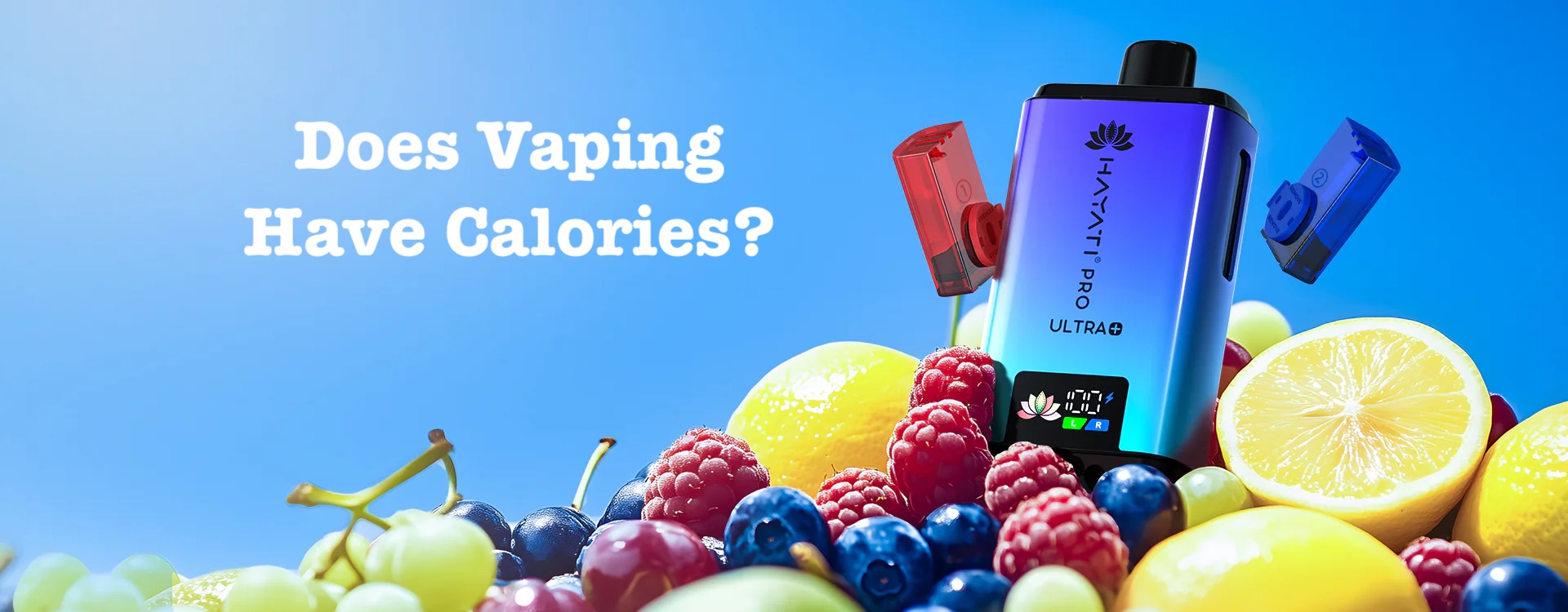As vaping becomes increasingly popular in the UK, many users are curious about how it affects their health beyond just nicotine. One surprising question that often comes up is: does vaping have calories? If you’re trying to manage your weight, follow a strict diet, or simply understand more about your vaping habit, this blog will help clear the air.
Table of Contents
- What’s Inside Vape Juice?
- Does Vaping Actually Deliver Calories?
- Does Vaping Make You Gain Weight?
- Can Vaping Help with Cravings?
- How Does Vaping Compare to Sugary Snacks?
- Does Vaping Break a Fast?
- Common FAQs
- Final Thoughts
What’s Inside Vape Juice?
To determine whether vaping adds calories to your diet, we need to look at what vape juice – also called e-liquid – is made of. The primary components include:
- Propylene Glycol (PG) – a synthetic food additive used to carry flavor.
- Vegetable Glycerin (VG) – a natural sweet liquid derived from plant oils.
- Flavourings – food-grade ingredients, often sweet or fruity.
- Nicotine – optional, varies by product. Most rechargeable vapes in the UK contains 2% (20mg) nicotine. This is the maximum nicotine content allowed under UK law.
Both PG and VG are commonly used in food and cosmetics. They’re classified as sugar alcohols and contain approximately 4 calories per gram. However, unlike food, vape juice is inhaled, not swallowed, which changes the way your body processes it.
Does Vaping Actually Deliver Calories?
Technically, yes – vape juice contains calories. But practically speaking, the amount absorbed into your body is extremely small.
Here’s why: when you inhale vapor, most of the PG and VG is either exhaled or dispersed into the lungs without being metabolized. According to experts, the actual calorie intake from vaping is negligible. A full 2ml vape pod may contain 10-20 total calories, but less than 1-2 calories are absorbed during regular use.
That means vaping is virtually calorie-free – far less impactful than eating even a single piece of candy.
Does Vaping Make You Gain Weight?
There is no evidence that vaping leads to weight gain through calorie intake. In fact, nicotine is an appetite suppressant, and some users report vaping helps them curb cravings for snacks or sweets. However, this doesn’t mean vaping is a safe or recommended tool for weight control.
In some cases, people may gain weight after quitting smoking or vaping because their appetite returns to normal, or they replace the habit with increased food consumption. This is a behavioral effect, not related to calories in vapor.
Can Vaping Help with Cravings?
Flavoured vapes – like cherry ice, strawberry ice, or gummy bear – can psychologically satisfy users who crave sugary or fruity tastes. This effect is more about sensation and habit than nutritional value. Vaping may distract from food cravings, but it should never be used as a substitute for meals or balanced nutrition.
How Does Vaping Compare to Sugary Snacks?
Let’s look at the numbers:
| Item | Approximate Calories |
|---|---|
| 1 chocolate bar | 250–300 kcal |
| 1 can of soda | 140–150 kcal |
| 1 vape pod (2ml) | 10–20 kcal (less than 2 absorbed) |
Clearly, vaping doesn’t contribute meaningful calories to your diet, even when using sweet or dessert-flavoured options.
Does Vaping Break a Fast?
This is a common concern among people practicing intermittent fasting. Since vaping doesn’t involve ingesting solid food or drink, and the caloric intake is almost zero, it technically doesn’t break a fast. However, sweet flavours may trigger insulin response in some sensitive individuals.
Common FAQs about “Does Vaping Have Calories”
Q: Does vape juice contain sugar?
A: No, vape juice does not contain sugar. It uses PG and VG, which are sweet-tasting but sugar-free substances.
Q: How many calories are in one puff of a vape?
A: Less than 0.01 calories per puff. You would need thousands of puffs to reach even 5 calories.
Q: Do flavoured vapes make you fat?
A: No. Flavours may mimic the taste of sweet foods, but they don’t contain fat or significant calories.
Q: Is vaping better than snacking?
A: From a calorie perspective, yes – but vaping is not a healthy food substitute. It should not replace a meal or snack.
Q: Does vaping affect your metabolism?
A: Nicotine can slightly increase metabolic rate, but this varies by person and is not a reliable weight control method.
Q: Does snus have more calories than vaping?
A: Yes. Snus, a smokeless tobacco product placed under the lip, is ingested through the mucous membranes and can contain measurable calories – primarily due to added sugars, flavours, and moisture content. Although still low, snus typically delivers more calories than vaping, which involves inhalation rather than ingestion. However, neither contributes significantly to daily caloric intake. Learn more information about snus and vaping, read our blog “Is Snus Better Than Vaping?“.
Final Thoughts
So, does vaping have calories? Yes, but barely. The calorie content in vape juice is so low it has no meaningful impact on your diet or weight. If you’re counting calories for health reasons, vaping is unlikely to interfere with your goals.
That said, it’s important to remember that vaping is not without risks. While it may not affect your waistline, it’s still a habit that should be approached responsibly.
Ready to Switch to Lower-Calorie Vaping?
Check out our top-rated low-calorie vapes, pods and kits, including customer favorites like Pyne Pod Click 50K, Hayati® Pro Ultra+ 25K, and Lost Mary® Nera 30K Pod Kit.
Stay informed, vape smart.
Disclaimer: This article is intended for informational purposes only and is not a substitute for professional medical advice. Always consult with your doctor before making any health-related decisions.

